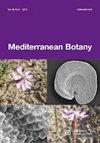Post-fire regeneration of cork oak (Quercus suber) in Kiadi forest (Akfadou- Algeria)
IF 0.7
4区 生物学
Q3 PLANT SCIENCES
引用次数: 1
Abstract
Cork oak (Quercus suber) as a West Mediterranean species is known for its ecological, economic and social values. Wildfires are one of the most serious problems threatening Quercus suber, endangering its occurrence in its area of distribution. Therefore, knowing the behavior of the species after fire and the factors influencing its responses are particularly important for forest management. In this study we assessed the post fire vegetative recovery in 730 trees affected by wildfires on 2014 in Kiadi cork oak forest, located in the Western side of Akfadou Mountains in Algeria. Few months after the fire, individual tree mortality was very low (7.53%), and nearly, all the trees sampled survived the fire since almost all trees resprouted from canopy and some of them showed basal resprouts. Moreover, those two modes of post fire vegetative recovery were not correlated to each other. The performed redundancy analyzes (RDA) revealed that the cork oak post-fire response was highly correlated with individual characteristics and with the environmental data. The main variables influencing the likelihood of good or poor vegetative recovery were the understory height and cover, soil characteristics, fire severity, tree status (alive/dead trees), tree diameter and tree exploitation. Our results confirmed the fire resistance of cork oak species; which is also the only Algerian tree to resprouts. Hence, this makes the species a good candidate for reforestation programs in fire prone ecosystems.阿尔及利亚Akfadou Kiadi森林栎(Quercus suber)火灾后的再生
栓皮栎(Quercus suber)作为一种西地中海树种,以其生态、经济和社会价值而闻名。森林大火是威胁栓皮栎最严重的问题之一,危及栓皮栎在其分布地区的生长。因此,了解火灾后物种的行为及其影响因素对森林管理尤为重要。在这项研究中,我们评估了2014年阿尔及利亚Akfadou山脉西侧Kiadi软木栎林中730棵受野火影响的树木的火灾后营养恢复情况。火灾发生几个月后,树木的单株死亡率很低(7.53%),几乎所有的树木都能在火灾中幸存下来,因为几乎所有的树木都能从冠层重新发芽,其中一些树木表现出基部的重新发芽。两种植被恢复模式之间不存在相关性。所进行的冗余分析(RDA)表明,栓皮栎火灾后的反应与个体特征和环境数据高度相关。影响植被恢复好坏可能性的主要变量是林下高度和覆盖度、土壤特征、火灾严重程度、树木状态(活树/死树)、树径和树木开发利用。我们的研究结果证实了栓皮栎的耐火性;这也是阿尔及利亚唯一一种发芽的树木。因此,这使得该物种成为易发火灾生态系统中重新造林计划的良好候选者。
本文章由计算机程序翻译,如有差异,请以英文原文为准。
求助全文
约1分钟内获得全文
求助全文
来源期刊

Mediterranean Botany
Agricultural and Biological Sciences-Plant Science
CiteScore
2.40
自引率
10.00%
发文量
30
审稿时长
12 weeks
期刊介绍:
Mediterranean Botany (ISSNe 2603-9109), formerly Lazaroa, is a biannual journal that publishes original research studies in the field of Botany including plant systematics, vegetation ecology, biogeography, evolutionary biology, ecophysiology, community ecology, ethnobotany and conservation biology on Mediterranean biomes but also in interacting areas.
Mediterranean Botany is an OPEN ACCESS Journal, free of charges for any published article.
 求助内容:
求助内容: 应助结果提醒方式:
应助结果提醒方式:


